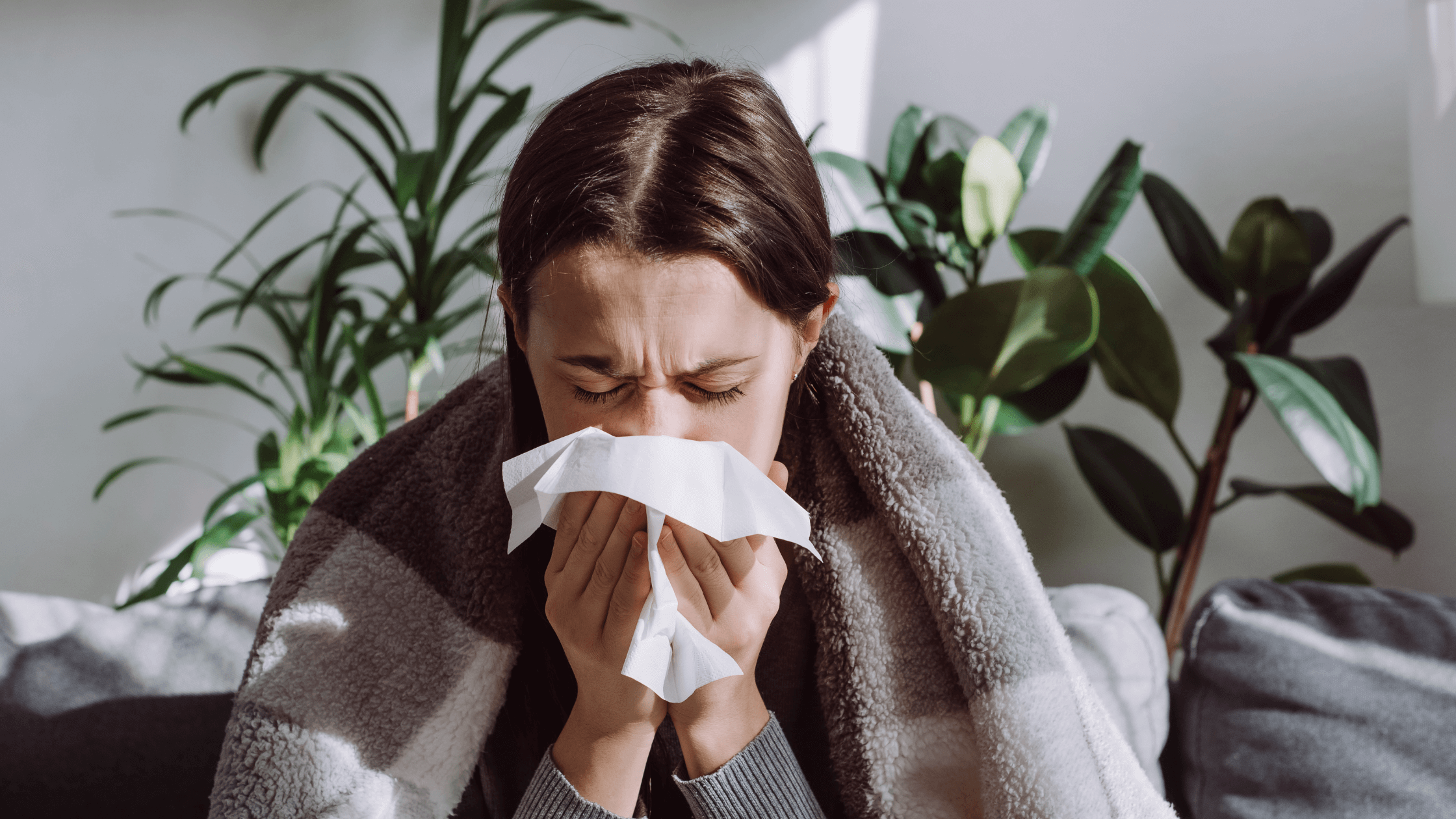Winter often feels like the season when everyone’s sniffling, coughing, and blaming the cold for their woes. But much of what we think we know about staying healthy during colder months isn’t backed by science. For workers braving harsh outdoor conditions and long hours, practical health tips—not myths—are the key to staying strong and on the job. It’s time to debunk things like cold makes you sick, and loading up on vitamin C will keep you healthy.
Why you get sick in the winter
It’s not the cold itself that makes people sick—it’s the perfect storm of factors that come with winter. Shorter days mean less sunlight, leading to lower vitamin D levels, a key player in immune health. Add to that more time spent indoors in close quarters, where viruses can quickly spread, and it’s no wonder colds and the flu run rampant this time of year.
These challenges are magnified for construction workers or anyone in physical fields. Long hours in extreme weather can take a toll on the body, leaving it more vulnerable to illness. Stress from tight project deadlines can weaken your immune system even further, and irregular meals—or grabbing whatever is easiest on the go—can mean missing out on the nutrients your body needs to fight germs. Staying healthy in winter starts with understanding these challenges and making small, smart changes to address them.
The top health myths to say goodbye to
1. Cold weather makes you sick

Many believe stepping outside on a chilly day without a hat or coat will immediately cause a cold. This is one of the most persistent myths, often reinforced by worried family members and coworkers.
Why this isn’t true:
Sorry, Mom. The reality is that viruses—not the temperature—cause colds and the flu. While cold air doesn’t make you sick, it can dry out your nasal passages, making it easier for germs to enter your system. That’s why it might seem like the cold is to blame when the real culprits are the viruses circulating in crowded spaces like break rooms or job sites.
Do this instead:
Instead of bundling up to “ward off illness,” focus on proven prevention methods. Wash your hands regularly to stop the spread of germs, stay hydrated to keep your body functioning at its best, and fit in some exercise to boost your immune system. Staying active—even in winter—helps keep your body strong and ready to fight off anything that comes your way.
2. Wet hair causes colds
Many people have been told that going outside with wet hair in cold weather is an invitation to get sick. This belief has been passed down for generations, making it seem like a hard rule to follow.
Why this isn’t true:
The truth is that colds are caused by germs, not damp hair or chilly air. Stepping out with wet hair might make you feel cold and uncomfortable, but it doesn’t increase your chances of catching a virus. You’ll only get sick through exposure to someone already carrying a virus.
Do this instead:
Dry your hair before heading out for your comfort and to avoid unnecessary heat loss, but don’t stress about it leading to illness. Instead, focus on avoiding contact with germs by washing your hands frequently and avoiding close contact with unwell people. Your immune system, not your hairstyle, keeps sickness at bay.
3. Loading up on vitamin C will prevent colds

There’s a common belief that downing vitamin C supplements or orange juice by the gallon will keep you utterly immune to colds. Many swear by it as their go-to defense during cold and flu season.
Why this isn’t true:
While vitamin C is undeniably essential for immune health, it’s not a magical shield against every germ. Studies have shown that while it may slightly shorten the duration of a cold, it doesn’t prevent you from catching one in the first place—no matter how much you take. Relying solely on vitamin C can mean missing out on other nutrients your immune system needs to function properly. Plus, excessive sugar consumption can actually suppress your immune system, not bolster it.
Do this instead:
Focus on eating a balanced diet that includes a variety of immune-boosting nutrients. Incorporate foods rich in zinc (like nuts and seeds) and vitamin D (such as fortified dairy or fatty fish), which are crucial in keeping your immune system strong. While a glass of OJ won’t hurt, it’s only one piece of the puzzle when it comes to staying healthy in the winter.
4. Dressing warm will prevent sickness

Many people are convinced that bundling up in extra layers is the secret to avoiding illness during the winter months. The idea is that staying warm somehow protects you from getting sick.
Why this isn’t true:
While being warm and cozy is certainly more comfortable, it won’t prevent you from catching a virus. Sickness is caused by exposure to germs, not by your body temperature or the layers of clothing you’re wearing. However, neglecting to dress appropriately for the weather can lead to other serious issues, like frostbite or hypothermia, which weakens your body and makes you more susceptible to illness.
Do this instead:
Dress warmly to protect yourself from the elements, but focus on the habits that really prevent sickness. Prioritize proper hygiene, like regular handwashing, and ensure you get enough rest to keep your immune system strong. Staying warm is important for your overall health and safety, but it’s not a direct defense against colds or the flu.
5. Fluctuating temperatures make you sick
Some believe that going from a toasty indoor environment to the freezing outdoors—or vice versa—puts the body under stress, making it more vulnerable to illness. Rapid temperature changes are thought to weaken the immune system.
Why this isn’t true:
Your body is remarkably good at regulating its temperature and adapting to changes. Fluctuating temperatures don’t weaken your immune system or make you more susceptible to viruses. What causes sickness are germs, not the temperature shifts themselves.
Do this instead:
Instead of worrying about the thermostat, focus on strengthening your immune system. Eating a balanced diet packed with essential nutrients, getting enough sleep, and managing stress are far more effective ways to stay healthy. Staying consistent with these habits is the key to fighting winter illnesses.
6. Warm/hot liquids help prevent colds

Many swear by hot tea, soup, or other warm drinks to fend off colds during winter. They believe that these comforting remedies can somehow keep illness at bay.
Why this isn’t true:
While sipping on hot liquids can be soothing and help alleviate symptoms if you’re already sick, they don’t kill germs or stop you from getting sick in the first place. Viruses cause colds, and unfortunately, no amount of hot tea can prevent them.
Do this instead:
Focus on staying hydrated with hot tea, cold water, bone broth, or anything in between. Fluids help keep your mucous membranes moist, which can provide a barrier against germs entering your system. Staying hydrated supports your overall health and ensures your body can fight off illness more effectively.
How to (actually) stay healthy this winter
Beating cold and flu season takes a combination of smart habits and proactive care, especially for workers who spend long hours outdoors or in close quarters with others. Here are some practical tips to help you stay strong all season long:
- Practice good hygiene: Regular handwashing is one of the simplest and most effective ways to prevent the spread of germs. Keep sanitizing wipes or sprays handy for high-touch surfaces like tools, door handles, and shared equipment.
- Incorporate immune-boosting foods: Include nutrient-rich options like leafy greens, citrus fruits, nuts, seeds, and fatty fish in your meals. These foods are packed with vitamins and minerals that strengthen your immune system.
- Prioritize rest and stress management: Long shifts and tight deadlines can leave you feeling run down, which weakens your immune defenses. Make sleep a priority and find ways to manage stress, whether through exercise, meditation, or taking a little downtime when possible.
- Use cold-weather gear: Invest in high-quality clothing and accessories for outdoor work. Layering with thermal or moisture-wicking fabrics can keep you warm without compromising comfort. Staying warm helps you focus and prevents conditions like frostbite and hypothermia.
- Consider vitamin D supplements: Shorter days and less sunlight exposure can lower your vitamin D levels, which play a key role in immune health. A daily supplement can help fill the gap if you’re not getting enough through sunlight or diet.
Bottom line
Winter doesn’t have to be the season of endless colds and sniffles. You can stay healthy and strong through the colder months by ditching outdated myths and focusing on science-backed practices. Whether maintaining proper hygiene, eating nutrient-packed meals, dressing appropriately for the weather, or managing stress, small changes can make a big difference—especially for those in physically demanding jobs like construction.
Don’t let the season slow you down. Stay ahead with practical tips and resources tailored for workers like you. Subscribe to our newsletter for expert advice and insights to keep you at your best year-round.


